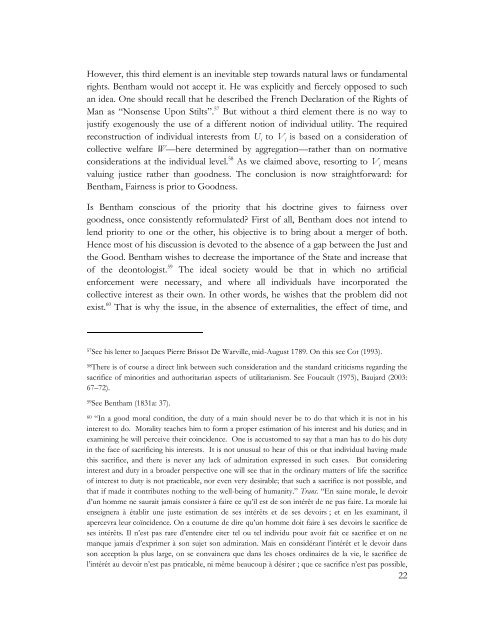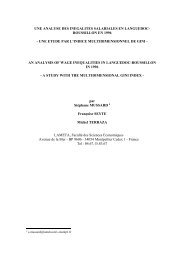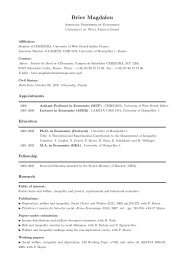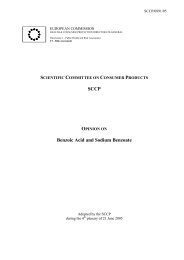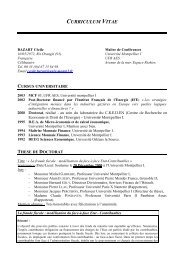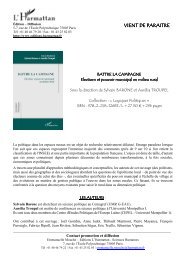COLLECTIVE INTEREST VS - Lameta
COLLECTIVE INTEREST VS - Lameta
COLLECTIVE INTEREST VS - Lameta
Create successful ePaper yourself
Turn your PDF publications into a flip-book with our unique Google optimized e-Paper software.
However, this third element is an inevitable step towards natural laws or fundamentalrights. Bentham would not accept it. He was explicitly and fiercely opposed to suchan idea. One should recall that he described the French Declaration of the Rights ofMan as ―Nonsense Upon Stilts‖. 57 But without a third element there is no way tojustify exogenously the use of a different notion of individual utility. The requiredreconstruction of individual interests from U i to V i is based on a consideration ofcollective welfare W—here determined by aggregation—rather than on normativeconsiderations at the individual level. 58 As we claimed above, resorting to V i meansvaluing justice rather than goodness. The conclusion is now straightforward: forBentham, Fairness is prior to Goodness.Is Bentham conscious of the priority that his doctrine gives to fairness overgoodness, once consistently reformulated? First of all, Bentham does not intend tolend priority to one or the other, his objective is to bring about a merger of both.Hence most of his discussion is devoted to the absence of a gap between the Just andthe Good. Bentham wishes to decrease the importance of the State and increase thatof the deontologist. 59 The ideal society would be that in which no artificialenforcement were necessary, and where all individuals have incorporated thecollective interest as their own. In other words, he wishes that the problem did notexist. 60 That is why the issue, in the absence of externalities, the effect of time, and57 See his letter to Jacques Pierre Brissot De Warville, mid-August 1789. On this see Cot (1993).58 There is of course a direct link between such consideration and the standard criticisms regarding thesacrifice of minorities and authoritarian aspects of utilitarianism. See Foucault (1975), Baujard (2003:67–72).59 See Bentham (1831a: 37).60 ―In a good moral condition, the duty of a main should never be to do that which it is not in hisinterest to do. Morality teaches him to form a proper estimation of his interest and his duties; and inexamining he will perceive their coincidence. One is accustomed to say that a man has to do his dutyin the face of sacrificing his interests. It is not unusual to hear of this or that individual having madethis sacrifice, and there is never any lack of admiration expressed in such cases. But consideringinterest and duty in a broader perspective one will see that in the ordinary matters of life the sacrificeof interest to duty is not practicable, nor even very desirable; that such a sacrifice is not possible, andthat if made it contributes nothing to the well-being of humanity.‖ Trans. ―En saine morale, le devoird‘un homme ne saurait jamais consister à faire ce qu‘il est de son intérêt de ne pas faire. La morale luienseignera à établir une juste estimation de ses intérêts et de ses devoirs ; et en les examinant, ilapercevra leur coïncidence. On a coutume de dire qu‘un homme doit faire à ses devoirs le sacrifice deses intérêts. Il n‘est pas rare d‘entendre citer tel ou tel individu pour avoir fait ce sacrifice et on nemanque jamais d‘exprimer à son sujet son admiration. Mais en considérant l‘intérêt et le devoir dansson acception la plus large, on se convaincra que dans les choses ordinaires de la vie, le sacrifice del‘intérêt au devoir n‘est pas praticable, ni même beaucoup à désirer ; que ce sacrifice n‘est pas possible,22


